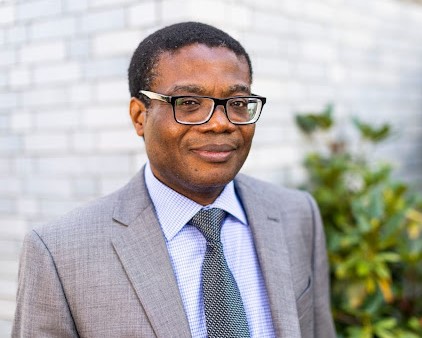PhD Program 40th Anniversary Alumni Profile: Meet Olubunmi Faleye, ‘02
As 2024 comes to a close, we continue to celebrate the 40th anniversary of the Alberta School of Business PhD program by highlighting the accomplishments of another distinguished graduate, Olubunmi Faleye, ‘02. Now a professor of finance at the D’Amore-McKim School of Business at Northeastern University in Boston, MA, Faleye has built a career that blends groundbreaking research at the intersection of labor and financial economics with academic leadership.
 He previously served as department chair (2018–2021) and most recently as senior associate dean of Faculty & Research (2021–2024), roles that have given him unique insights into the academic research enterprise.
He previously served as department chair (2018–2021) and most recently as senior associate dean of Faculty & Research (2021–2024), roles that have given him unique insights into the academic research enterprise.
Having recently transitioned back to full-time teaching, Faleye continues to explore pressing global challenges in capital allocation and financial systems. His current research delves into boards of directors and institutional shareholder activism, continuing a tradition of exploring the dynamic interplay between theory and practice. Reflecting on his time at the Alberta School of Business, Faleye highlights the foundational lessons that shaped his approach to research and academic success.
How has the Alberta School of Business PhD program influenced your approach to finance research?
I’m an empirical researcher, and empiricists especially need to guard against an atheoretical mindset because it’s very easy to search for empirical relations that provide a good storyline but without grounding in economic theory. My time in the Alberta School of Business PhD program taught me that good empirical research must be grounded in theory. This has served me well over the course of my career so far, and I’m grateful to my teachers and supervisors.
Can you describe a moment or project during your PhD that had a lasting impact on you?
I had a limited-term teaching position at Mount Allison University for two years during which time I developed a passion for teaching and decided to pursue an academic career. My connection to the U of A was established through Karim Jamal, whom I met while we were both serving on a CPA Canada education committee in the early 1990s. Karim was an Alberta faculty member (accounting department) and did an excellent job promoting the benefits of pursuing my PhD at the U of A. Had I not met Karim, I am doubtful I would have chosen to attend the U of A, so I owe him a large debt of gratitude!
How did your time in the PhD program prepare you for tackling complex financial research questions?
I had great teachers who provided me with a solid foundation for conducting empirical research in finance. Professor Adolf Buse’s course in applied econometrics and Professor David Jobson’s courses in multivariate data analysis were instrumental in my understanding of the intricacies of advanced analytical methods for finance research. These courses also provided the foundation that allows me to keep up with new tools for data analysis as they’re developed and introduced into the literature.
My dissertation committee members (Professors Randall Morck, Vikas Mehrotra, and Mark Huson) taught me the importance of perseverance and thinking outside the box to a successful research program. They provided invaluable guidance but also allowed me to be in the driver’s seat of my dissertation research. This has made it possible for me to become the independent and successful researcher that I am today.
What role do you see finance research playing in addressing global economic challenges?
Finance deals with the efficient allocation of capital for productive uses. Economies grow and people prosper when capital is efficiently allocated to its best uses. Much of the world today is mired in low growth, high inflation, less innovation, and underutilized human resources because of fundamental problems in the capital allocation process. Finance research has the potential to provide solutions to these problems by uncovering obstacles that prevent the efficient use of capital, proffering solutions that encourage growth and innovation, identifying and mitigating systemic risk, and creating frameworks that facilitate broad-based access to capital and the financial markets for individuals both as investors and business owners.
What’s the most unusual or surprising place your research has taken you?
My research often requires hand-collecting data from a variety of sources. For a recent project, I had to collect biographical, domicile, and voting data for a large number of corporate leaders. This involved scouring multiple online sources, including public records, regulatory filings, and newspaper archives. More often than not, I found myself also reading obituaries to confirm data from other sources. To my surprise, I learned you could uncover a lot about people by reading their obituaries. It’s amazing the variety and amount of information people put into them.
What advice would you give to current or prospective PhD students?
Take charge of your academic destiny. Remember, it’s your career and the most important factor for your success is you. Seek counsel from your advisors and professors, but don’t waste valuable time waiting for them to tell you what to research or how to go about your projects.
Subscribe to UAlberta Business
Become part of our community. Get the latest news and event information from the Alberta School of Business in your inbox every month.